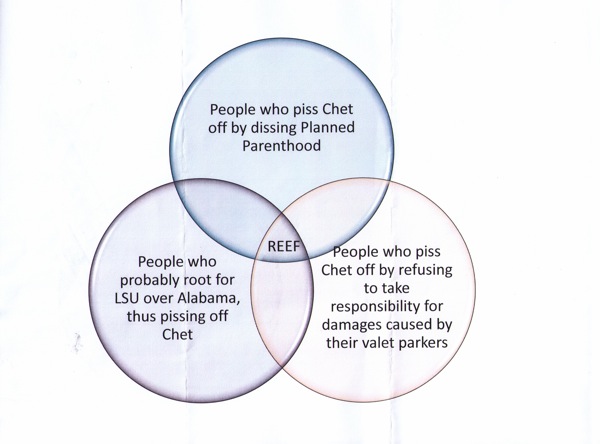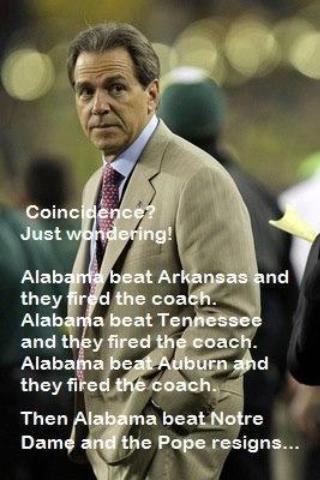THIS IS SARAH PALIN PLUS HONEY BOO BOO.

YOUR ARGUMENT IS INVALID.
(Seriously, come for Mike Tyson + Michelle Obama, but stay for Anne Hathaway + Voldemort.)
h/t: BoingBoing

THIS IS SARAH PALIN PLUS HONEY BOO BOO.

YOUR ARGUMENT IS INVALID.
(Seriously, come for Mike Tyson + Michelle Obama, but stay for Anne Hathaway + Voldemort.)
h/t: BoingBoing
The heretofore anchor donor for the Houston Area Women’s Center’s fundraising efforts has pulled out and abandoned them.
Help the HAWC with a single donation here. Or, better, do as I do and give them a monthly donation. You never notice it, but they damn sure will.
I joked about refusing to support or care anymore after their move to the AL, but this is seriously bullshit. They can fuck off as far as I’m concerned, for now and evermore. I’ll take what little baseball amusement I need from the Nats.
Sen. Marco Rubio (R-FL) is so upset about the IRS targetting anti-tax Tea Party groups that he’s insisting that the IRS commissioner resign.
What makes this hilarious? Rubio is apparently unaware that, at present, there is no IRS commissioner, and hasn’t been since Bush’s appointee resigned last November. This is, in no small part, because the Senate Republicans are more or less refusing to confirm anybody for anything, though Obama’s folks aren’t pushing that point nearly hard enough.
Consequently, dear Marco, there is no head to roll here because there’s nobody in the office. Oops!
I’ll take mine over ice, with a twist.
I dunno about you, but a party steeped in lies, infidelity, heartbreak, and despair — and ending in murder and, worse, a return to the midwest — just doesn’t seem all that fun.
I humbly suggest that market-droids and whatnot actually read the goddamn book first next time, lest we find ourselves invited, to, I dunno, a baby shower inspired by A Farewell to Arms.
This is all over the net, but, dammit, just watch it.
Commander Hadfield wins everything forever.
In the wake of news that there’s yet another reason to hate Reef and Bryan Caswell, we received a bit of fan mail this week from a purported “Mystery Fan”:

We encourage your continued avoidance of all Caswell-infected properties: Reef, Little Bigs, El Real, etc.
This set of color shots from 1939-43 is completely stellar.
Thanks, Rick!
First: I get that it seems untoward, but it’s a group hostile to taxation and shot through with some wingnuts. Complaining about increased IRS scrutiny seems a lot like NORML complaining about the same thing. Neither should happen, but when you have people paid to find lawbreakers and groups dedicated to changing/breaking those laws, well…
Second: there is, obviously, more to it than you’ll see on TV.
It appears Saban’s gridiron success is resulting in a dramatic uptick in applications to UA, and the upshot is a LOT more out of state tuition revenue:
Since 2007, Tuscaloosa has swelled its undergraduate ranks by 33% to over 28,000 students. Faculty count has kept pace: up 400 since 2007 to over 1,700. But it’s more than growth — it’s where the growth is coming from. According to the school, less than a third of the 2007 freshman class of 4,538 students hailed from out of state. By the fall of 2012, more than half (52%) of a freshman class of 6,397 students did. Various data from US News and the New York Times shows that the school’s out-of-state tuition cost — nearly three times higher than the rate for in-state students — rose from $18,000 to $22,950 a year during that period.
Add it all up — more students from outside Alabama paying ever-increasing premium tuition bills — and the school realized $50 million more in out-of-state tuition revenue for last fall’s incoming class than it did for the same class in 2007 ($76 million vs. $26 million).
It’s not just money, either:
For the admissions office, more applications mean more selectivity. Six years ago, 64% of students applying to the University of Alabama were accepted. By 2012, the acceptance rate had dropped to 53%. About one in four students from the 2012 freshman class carried a 4.0 high school GPA. The class also includes 241 National Merit Scholars, more than any other public university in the U.S.
Roll Tide.
Supposedly, this commercial damn near crashed the phone system in Alabama when it ran.
Turns out, lots of folks don’t turn their shit off on planes.
I wondered why all those planes were crashing OH WAIT.

(Via Reddit.)
And I say this as a notional beneficiary:

Yeah, that’s right. The top-paid state employee is a coach of some kind in 40 states (unless I miscounted), excluding only Nevada, Montana, the Dakotas, Maine, New York, Massachusetts, Vermont, Delaware, and Alaska.
The Onion: not just for fake journalism anymore.
You people are lucky I’m too busy today to install this.
This is my new ringtone for certain people.
Textastrophe.com documents what happens if the wrong people (e.g., the proprietors of the site in question) get ahold of your cell number.
This one is my favorite.
This dog is doomed to disappointment, at least for a year or two.
Maddow covers it in depth here, but the precis is that they’re rating Martina Navratilova’s statement that one may be fired in 29 states just for being gay as “half true” instead of (as it actually is) COMPLETELY TRUE because of weaselword weaselwordweaselword. Check it out — even though they completely admit in the article that her statement itself was true.
Politifact is so deeply afraid of being seen as left-leaning that they repeatedly make up reasons to represent statements by those on the left as mendacious when they clearly are not.
Fuck. Them.
Behold, his amazing 911 call, via Agent Rob.
I say this as someone who, generally speaking and despite an enjoyment of Mad Men, agrees with Bill Hicks about advertising, but this new Audi spot featuring old Spock and new Spock is a thing of utter beauty that should be enjoyed forever.
Charles Ramsey, welcome to your Warholian 15 minutes.
I think my favorite quote is “I barbecued with this dude. We eat ribs and whatnot, listen to salsa music!” Frankly, I probably need to capture that and make it somebody’s ringtone.
Tiny HD cameras have made high-quality video way easier to do; what these guys capture would impossible without it.
What is it? Oh, just point-of-view footage of a falcon diving at 200MPH+ to snag a duck from above. Taken with a camera mounted on the falcon’s back.
Link fixed.
It’s sort of weird the degree to which I no longer think it odd that I need to coordinate business activities in any given day across more than 3 or 4 time zones.
My personal high is eight: Singapore, all four in CONUS, the UK, Vienna, and Abu Dhabi. It would’ve been nine, but by that point we no longer had an Indian subsidiary.
Can’t abolish what you want to abolish? Just starve it of resources.
This is a thing of utter and complete beauty, and we should all be so lucky.
Bad Lip Reading takes on The Walking Dead. Oh god. Oh my. So much beauty…
“And that’s how they do it on Broadway!”
(Longtime Heathen may recall this similar gem from several years ago.)

(From this Tumblr.)
…but nobody beats Rochester Institute of Technology’s Escherian Stairwell. Check it out.
(MeFi.)
Via WilW, we find the Tumblr for the Ensemble Studio Theater in LA, which is run by Wil’s “space mom” Gates McFadden, and is filled entirely with pictures of an action figure of Beverly Crusher in amusing situations.
Programmer: So we’ll see only record types A, B, and C, right?
Finance: Yes. That’s all.
Programmer: Never D? We have some D here.
Finance: Actually, yes. You need to do $special_thing with D records.
Programmer: Okay, so A, B, C, and D after all. That it.
Finance: That’s all. We promise.
(Weeks later)
Finance: Where are my E records?
It’s distressing to me the degree to which rigorous logical thinking is completely alien to corporate finance people. I am reminded of the wise words of my friend R., who said “Normal people don’t see exceptions to rules as a big deal, so they forget to mention them. This is why programmers drink so much.”
(Use headphones unless you’re at home. Heh.)
(Via MeFi.)
It’s possible that you, like me, actually thought there were two well-received writers with minimally different names: the author of the much-lauded and long-running Culture series of hard-SF novels, called Iain M. Banks, and the literary novelist unconcerned with spaceships and robots and impossibly advanced spacefaring civilizations called Iain Banks.
Well, hold on to your hat, because if you’re as under a rock as I was about this, you’ll be shocked to hear that they’re the same guy. (The differentiating “M” probably says more about the degree to which science fiction is considered a ghetto than anything else I can think of.) Banks has written ten works in the Culture, plus some other non-Culture SF works, and in addition to 15 works of literary fiction, all since 1984. That’s a pretty solid output for either name, and a tremendous amount of output for one dude, but there you go. It’s little wonder the Times named him in their 2008 list of the 50 greatest British writers since 1945.
Anyway, I’d been curious about the Culture books for a while, and Googled around to see where I should start quite a while ago. The easy answer is to read them in publication order. If you do that, as I did, you’ll start with 1987’s Consider Phlebas. And you may well stop there, because Phlebas is a goddamn train wreck of a novel that really didn’t hold together well at all for me. It remains one of the few books I’ve simply abandoned despite being well over halfway done; I realized there was nothing that could happen that I would care about, and that I was wasting my time. Learn from my lesson.
I mentioned this reaction to some Culture-phile friends, and several of them said “Oh, gosh, yes, Phlebas is a terrible place to start. Try again with his second one, The Player of Games. It’s much, much better. You can ignore Phlebas completely.”
And so I did, and so it was. I really enjoyed it, and tore through it in a matter of days. Banks’ Culture is a phenomenally advanced spacefaring civilization spanning galaxies; they’ve solved the FTL problem thousands of years before, live predominately on enormous man-made orbital structures, and are mightier and more advanced than any civilization they encounter — not to mention considerably more enlightened. They exist in a post-scarcity state, where people may do more or less as they wish provided they don’t harm others. From Wikipedia:
The Culture stories are largely about problems and paradoxes that confront liberal societies. The Culture itself is an “ideal-typical” liberal society; that is, as pure an example as one can reasonably imagine. It is highly egalitarian; the liberty of the individual is its most important value; and all actions and decisions are expected to be determined according a standard of reasonability and sociability inculcated into all people through a progressive system of education. It is a society so beyond material scarcity that for almost all practical purposes its people can have and do what they want. If they do not like the behavior or opinions of others, they can easily move to a more congenial Culture population centre (or Culture subgroup), and hence there is little need to enforce codes of behavior.
In The Player of Games, Banks gives us Culture citizen Jernau Morat Gurgeh, a famous game player and scholar, who by hook and crook finds himself recruited by the Contact organization — responsible for finding, evaluating, and possibly contacting other cultures — to visit a far-away civilization called the Empire, steeped in power politics and (frankly) a sadistic glee in the suffering of others. The Empire is FTL-capable and includes several star systems, but like isolated central Asian tribes of the 19th century, cannot comprehend precisely how outclassed they are by the Culture — who, for their part, really have no interest in fighting at all. They mostly want to discourage or destabilize the existing retrograde, barbaric societal order in the hopes that something more reasonable will arise.
Their means are simple: the Empire is ordered entirely around a fiendishly complex game called Azad. Empire citizens learn it from childhood; performance in Azad tournaments determines one’s place in society. The winner of the periodic tournament becomes Emperor. Having made contact with these barbarians, the Culture send Gurgeh to enter this same tournament, figuring a “filthy alien” doing well at their holy game might be the push they need. Madcap hilarity ensues, obviously.
This whole setup may seem obvious — a game used as a metaphor for both state and the competition between states, and used to highlight the differences between modern egalitarian societies and repressive ones, etc. — but Banks handles it with a deft hand, so it doesn’t ever come close to collapsing under its own weight (which is, sadly, a common problem in the so-called “literature of ideas”). Plot and pacing are miles ahead of Phlebas. I’m intrigued by the Culture, by its interaction with other civilizations, and by the ways in which Banks explored those issues here. This is idea-SF done very, very well, and I’m no longer surprised about why Banks is so beloved.
It’s a certainty that I’ll read more Culture novels, and soon, but I do intend to savor them; the sad news this year — and what prompted me to finally go read Player — is that Banks announced about a month ago that he has terminal cancer, and is unlikely to live more than another year. There will be no more Culture novels; his literary novel The Quarry will be his last. In the Culture, one gets the idea that genofixing has long since done away with anything as banal as cancer; it’s a damn shame that the mind who gave us this fascinating far-future place cannot emigrate there instead of dying in Scotland.
I’ll make this brief: Oswalt is brilliant, and is a gifted writer, but he allows his comic sensibilities to get in the way here. The memoir portions of this collection of essays and assorted other bits are very strong, and I’d love to see more of that kind of thing from him — God knows he’s good at it, and it seems likely he’s got more such stories.
But what drags this book down are the filler bits where it feels like he’s trying to force standup material into essay form. He actually addresses this in the book, saying explicitly that he’s insecure about the personal essay portions and hopes to do more of them in the future as his comfort level increases; I hope so, too. I’d happily buy and read more. As for the rest, I found myself skimming rather than savoring those parts of this otherwise solid debut.
Zombie Spaceship Wasteland at Amazon.
That’s pretty much it: Owls are super, super cool.
Go check out my biking friend Alex’s video about Juan Carlos, the dancing rollerblader often seen in greater Montrose.
At a press event in France, Downey had a delightful response to co-star Gwyneth Paltrow’s fluent French:
Jesus, what tripe. This is a dumb person’s idea of what a smart person’s mystery is. It’s chock full of badly fleshed stock characters, entirely too many un-shocking developments that Flynn clearly sees as revelatory, and runs out of steam well before it runs out of pages. There is not a single “surprise” in the book that isn’t telegraphed WAY WAY WAY in advance, and that any halfway intelligent reader will see coming.
I’m reminded of something Dorothy Parker said: “This is not a novel to be tossed aside lightly. It should be thrown with great force.”
The only upside is that I now have a CLEAR CHOICE for “worst book read this year,” whereas before it was a tossup between The Night Circus and Empire State — neither are even in the same league of awfulness as Flynn, so congrats for that.
Look. I’m not quite sure what to say about this, other than it’s brilliant. There’s a lot going on here that has nothing to do with pencils, but also a shocking and unironic amount that is, clearly, 100% about pencils. It’s weird, and very hard to describe.
It’s short, fun, and perfectly apes the sort of mid-century trade guides that you may have encountered in your youth with something that’s not quite a wink and not quite sincerity while being a bit of both. I mostly read it because Rees was on the JoCo Cruise, and seemed remarkably funny — plus, possessed of a completely nonironic enjoyment and knowledge of pencils and pencil history. I’m still not sure what inspired him to do this book, but I can say it was fun to read.
Also, owing to a post-cruise email dialog with Rees and my own nerdery, I now have distinct preferences when it comes to pencils. Make of this what you will.
They’re tabling the knife thing because whining, apparently.
Faced with the choice, we decided this was a measure of safety and not in any way creepy:

It may not be immediately clear what I’m talking about. Let me help.

Yup. The world we live in.
Or sitting, or whatever. I rode the 100 on Saturday, and 66 on Sunday. I rolled into Austin at about 1:00 yesterday afternoon — inadvertently well ahead of most of my team, from whom I’d gotten separated. I lost too much time stopping on the long Saturday ride, so on Sunday I only hit one official rest stop to refill my water bottles; that turns out to be the secret to getting in ahead of everybody else.
It was: intense and amazing. I said as the weekend approached that I didn’t think I’d do it again if I did well this time around; training and preparation took so much time this spring that we missed or gave short shrift lots of activities we’d have liked to do. I’m not exactly sure when I changed my mind about that, but it was somewhere between Erin’s cheers at the century finish line and the intense team greeting we made a point to give all of our teammates when they arrived at our tent. This, it should be noted, is not universal — I didn’t hear anybody else making NEARLY as much noise when their folks came in, on either day. I think plenty of people end up on teams that are really just shared logistics at camp and little else, but the core of the Karbach team trained together all spring, and drank beer together, and as a result we really felt like a true TEAM. There’s even talk of doing more rides together this summer, which is something I’m absolutely going to do.
I should note that it’s not just me who had a change of heart about future MS150s; the Intrepid and Awesome Mrs Heathen (2013 Cheer Champion) was pretty clearly on board by sometime Saturday night, and probably for the same reaosns; on both days, she was enthusiastically helping to welcome our riders — an activity that extended well into Sunday afternoon, since we didn’t leave until about 5. It felt good to stay, and cheer, and encourage, and high-five, and just bask in the afterglow of the ride.
TL;DR? Was it hard? Yeah. I rode my bike to freakin’ AUSTIN. Was it worth it? You bet your ass.
Despite all this feel-good tomfoolery, do I have some snarky comments for you? OH YES:
Helpful hint: Check out what certain jersey patterns mean before you decide to use them for your whole team, especially if they’re not all made of monster climbers.
I’m no hardcore biker — I’m old and heavy and slow — but I also ride a pretty normal bike. By which I mean it’s only considered expensive when compared to Wal-Mart bikes. It’s a good bike, and it’s a nice bike, but it’s not super-fancy or anything. Buying a high-end tool when you’re a beginner runs the risk of making you look like an ass. ProTip: You don’t look like a jerk if you have to walk up a hill, unless the bike you’re pushing up the hill you couldn’t climb otherwise is $8,500 worth of carbon fiber race bike.
Oh, Austin, you’re adorable. Your tour course pylon placement can best be described as idiosyncratic. I’m all about you staying weird, but don’t you think “in a straight line” has some advantages vs. “all over the goddamn road?”
As long as we’re snarking on Austin: the signs insisting that MS150 riders ride only in the 2-foot bike lanes (that were filled with debris) had all the charm, authority, and effectiveness of a hall monitor whining about tardiness on the last day of school. There were 13,000 of us; the ROAD was our bike line.
Today, April 19, is the 70th anniversary of the most interesting bicycle ride EVER by a chemist named Albert Hoffman.
Celebrate in whatever way you deem appropriate.
Tomorrow morning at the absurdly early hour of 6:45AM, I’ll start the MS 150. If you haven’t ridden it, you are probably unaware that there are three starting points, resulting in three different distances for the first day. I feel strong, and the weather is good, so I’m planning on doing the full 100 mile route tomorrow.
Wish me luck.
I will, after the ride, reach out personally to each of you who have donated so generously in my name. I’m incredibly lucky to count such a generous and supportive group as my friends. I am amazed and gobsmacked by the level of support you’ve given me; at last count, over $2,500 has been donated to NMSS under my banner. That’s incredible. It’s a nice bit of good news, at least, at the end of a bleak and trying week — and it’s really only the tip of the iceberg when it comes to the ride. With 13,000 other riders telling simliar stories of their friends’ generosity, it’s likely the final fundraising total will be more than $15,000,000 — and that’s over and above the cost of the event.
I mentioned this on Facebook yesterday, but I want to note it again, here: If you donated in my name with a particular victim of multiple sclerosis in mind, please share their name with me, by email or in a comment here; first names only are fine if privacy is a concern. I may need a boost on that 100 mile ride tomorrow, so I have written the names shared with me so far on my race bib. This ride is for all victims of MS, but my ride is for these people dear to my own friends in particular.
Thanks again.
(Here comes the final pitch: If you’ve been putting off donating, it’s not too late. Consider giving “to” the Karbach team generally instead of to me (we need a bit more then $6K to meet our team goal), or pick a name from that list that’s below the $400 minimum — riders who don’t reach it will have to pay it themselves, in addition to the hundreds it costs to enter the ride.)
So, what happens when you wring out a washcloth in zero g?
As with many space-related things, it is completely awesome.
Longtime ersatz Attorney Acosta alerts us to a bounty that’s just too good to pass up. We’ll meet you in the northwest!
Sadly, no word yet on Wildboy…
His “Star Wars Filibuster” from Parks & Recreation is a thing of utter wonder and beauty. Make time (8:43).